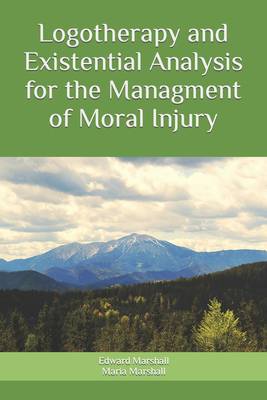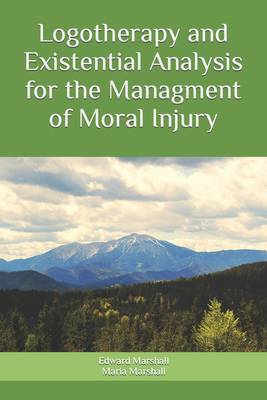
- Afhalen na 1 uur in een winkel met voorraad
- Gratis thuislevering in België vanaf € 30
- Ruim aanbod met 7 miljoen producten
- Afhalen na 1 uur in een winkel met voorraad
- Gratis thuislevering in België vanaf € 30
- Ruim aanbod met 7 miljoen producten
Zoeken
Logotherapy and Existential Analysis for the Management of Moral Injury
Maria Marshall, Edward Marshall
Paperback | Engels
€ 45,95
+ 91 punten
Omschrijving
The COVID-19 pandemic brought Moral Injury (MI) to the forefront of clinical attention and research. This multi-dimensional syndrome has been first described in the military context and is now understood to affect people in other occupations such as health care, business, education, law enforcement, the legal profession, disaster relief, international aid, social justice, as well as other areas of social and occupational functioning. Moral injury occurs when deeply held beliefs, ethical and moral principles have been trespassed. The violation of universal values and personal principles can be committed by oneself or by others. Witnessing potentially morally injurious events gives rise to guilt, shame, remorse, anger, disgust, feelings of betrayal, spiritual struggles and disorientation, loss of meaning, and despair. The secondary symptoms of moral injury may include anxiety, depression, and post traumatic stress. The symptoms of moral injury can vary in intensity and can present from mild to severe, seriously impairing functioning. Moral injury is not considered a mental illness but a syndrome that warrants clinical attention.
Employing a phenomenological hermeneutic method of systematically reviewing pertinent texts, the present study explores the lived experience of moral injury in relation to assessment and treatment methods currently available. Conceptually, research indicates that self care, moral resilience, and social support are linked with factors such as resiliency, post-traumatic growth, and self-transcendence. These factors are correlated with meaning, a key factor in wellness following existential frustration and distress. Thus, a holistic body, mind and spirit approach to the assessment and response to moral injury is warranted.
Viktor E. Frankl's Logotherapy and Existential Analysis (LTEA) is an evidence-based meaning-centered approach to psychotherapy and counselling that has been successfully applied in the treatment of conditions involving existential issues. The present research examines the contribution of LTEA to the conceptual understanding of moral injury and to its related symptomatology. It details the application of LTEA principles and structured meaning-centered interventions in responding to moral injury. The applications are illustrated with examples that help to position this method into a holistic framework promoting re-connection, renewal, and health.
Employing a phenomenological hermeneutic method of systematically reviewing pertinent texts, the present study explores the lived experience of moral injury in relation to assessment and treatment methods currently available. Conceptually, research indicates that self care, moral resilience, and social support are linked with factors such as resiliency, post-traumatic growth, and self-transcendence. These factors are correlated with meaning, a key factor in wellness following existential frustration and distress. Thus, a holistic body, mind and spirit approach to the assessment and response to moral injury is warranted.
Viktor E. Frankl's Logotherapy and Existential Analysis (LTEA) is an evidence-based meaning-centered approach to psychotherapy and counselling that has been successfully applied in the treatment of conditions involving existential issues. The present research examines the contribution of LTEA to the conceptual understanding of moral injury and to its related symptomatology. It details the application of LTEA principles and structured meaning-centered interventions in responding to moral injury. The applications are illustrated with examples that help to position this method into a holistic framework promoting re-connection, renewal, and health.
Specificaties
Betrokkenen
- Auteur(s):
- Uitgeverij:
Inhoud
- Aantal bladzijden:
- 270
- Taal:
- Engels
Eigenschappen
- Productcode (EAN):
- 9798519594585
- Verschijningsdatum:
- 12/06/2021
- Uitvoering:
- Paperback
- Formaat:
- Trade paperback (VS)
- Afmetingen:
- 152 mm x 229 mm
- Gewicht:
- 362 g

Alleen bij Standaard Boekhandel
+ 91 punten op je klantenkaart van Standaard Boekhandel
Beoordelingen
We publiceren alleen reviews die voldoen aan de voorwaarden voor reviews. Bekijk onze voorwaarden voor reviews.











